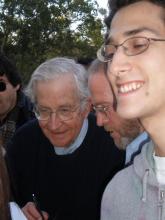Noam Chomsky

On 10/4, Noam Chomsky spoke at a Stanford Says No To War rally as a pit stop on his way to speak at Gunn HS, where the Peninsula Peace and Justice Center was holding a very large Chomsky event.
At Stanford, he was asked to speak about Condoleezza Rice's position at Stanford. He went against the grain of most of the other speakers. His argument was that, while Rice should probably be held accountable as a war criminal, Stanford and any university should strive to be apolitical and be solely about the dissemination of knowledge. In other words, he thinks that Stanford should be able to hire a war criminal (as long as she isn't penalized by the United States as a whole), a terrorist, or anyone else who had done questionable things in the past as long as, in their tenure at the university, they don't do anything that goes against the values of the university.
I also got a picture of myself standing near Chomsky when he was walking over to the car to go over to Gunn. There were too many hoards of people to actually talk with him, but it's the proximity that counts, right?
At Gunn, he had a much longer talk on broader themes. Hearing him talk was amazing. I think I learned something new and astounding in every sentence. Chomsky must have a photographic memory because he was quoting 20 year old news articles and even older US government declassified documents without looking at any notes. In the question and answer period, he got questions by activists about the specific programs that they had been working on for years, and it was clear that Chomsky knew much more about those programs than them. Before this talk, I knew that he was smart and that I agreed with his philosophy and politics, but now I can really see why he is the most cited and accoladed intellectual of our time. He is a genius.
He made me feel nervous about going into CS rather than trying to change US institutions to be more just. At least with CS, I'll be able to go into anything I want to in the future. He made me feel like democracy (and educating and activating the populace and limiting corporate control) were very essential for a just society. Chomsky also made me think about how important the US is, and how change from within and being critical of US institutions is important.
He made me feel hopeful about the future because of movements in Latin America (first time in 500 years they have thrown off European control), protest of Iraq before the war started, and the first coup in Latin America (the one in Honduras) that the CIA wasn't responsible for and that the US didn't officially endorse.
He made me feel more critical about Obama. The financial folks that caused the economic crisis are scoring record profits because Too Big to Fail is an insurance policy for the rich paid for by the poor. The healthcare proposal will help insurance companies by guaranteeing more customers without providing a public option that will be more efficient. Despite rhetoric, Obama didn't push through anything substantive at Copenhagen. Obama wasn't critical of Saudia Arabia or Egypt for being dictatorships without respect for human rights when he talked in Kairo. Obama is escalating the war in Afghanistan. Yes, he's better than neoconservative, first-term Bush, but he's fairly similar to a slightly more sane / moderate second-term Bush. Yet because we narrow the political spectrum so much, we think of him as an extremely liberal politician rather than a centrist.


